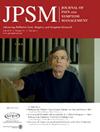Depression and Cancer Pain: Mediating Roles of Anxiety and Pain Beliefs
IF 3.5
2区 医学
Q2 CLINICAL NEUROLOGY
引用次数: 0
Abstract
Context
The psychological mechanisms linking depression and pain in cancer remain unclear despite consistent evidence of their strong association.
Objectives
To investigate psychological pathways underlying the relationship between depression and pain, mediated by anxiety and pain-related beliefs.
Methods
The participants were 140 adults with a confirmed cancer diagnosis, recruited from three university hospitals in South Korea between April 2024 and May 2025. Participants completed self-report questionnaires, including the M. D. Anderson Symptom Inventory, Hospital Anxiety and Depression Scale, and the Pain Beliefs and Perceptions Inventory.
Results
A serial-parallel mediation analysis revealed no significant direct effects of depression on pain severity. However, a significant indirect effect was observed through anxiety and the belief that pain is persistent (Time) (b = 0.101, 95% CI [0.032, 0.185]). This pathway differed significantly from other indirect effects. Higher depression levels were associated with greater anxiety, which, in turn, was associated with a stronger belief that pain is persistent, and ultimately, with higher pain severity.
Conclusion
Depression may indirectly contribute to greater pain severity in patients with cancer patients through anxiety and the belief that pain is persistent. These findings underscore the need to address emotional distress and maladaptive pain beliefs in the psychological management of cancer-related pain.
抑郁与癌症疼痛:焦虑和疼痛信念的中介作用。
背景:尽管有一致的证据表明癌症患者的抑郁和疼痛之间有很强的联系,但它们之间的心理机制仍不清楚。目的:探讨焦虑和疼痛相关信念介导的抑郁与疼痛关系的心理通路。方法:参与者是140名确诊癌症的成年人,于2024年4月至2025年5月从韩国的三所大学医院招募。参与者完成了自我报告问卷,包括m.d.安德森症状量表、医院焦虑和抑郁量表以及疼痛信念和感知量表。结果:一项串联-平行中介分析显示抑郁对疼痛严重程度没有显著的直接影响。然而,通过焦虑和认为疼痛持续(时间)观察到显著的间接影响(b = 0.101,95% CI[0.032, 0.185])。这一途径明显不同于其他间接效应。抑郁程度越高,焦虑程度越高,而焦虑程度越高,疼痛持续的信念越强,最终疼痛的严重程度也越高。结论:抑郁可能通过焦虑和持续疼痛的信念间接导致癌症患者更严重的疼痛。这些发现强调了在癌症相关疼痛的心理管理中解决情绪困扰和不适应疼痛信念的必要性。
本文章由计算机程序翻译,如有差异,请以英文原文为准。
求助全文
约1分钟内获得全文
求助全文
来源期刊
CiteScore
8.90
自引率
6.40%
发文量
821
审稿时长
26 days
期刊介绍:
The Journal of Pain and Symptom Management is an internationally respected, peer-reviewed journal and serves an interdisciplinary audience of professionals by providing a forum for the publication of the latest clinical research and best practices related to the relief of illness burden among patients afflicted with serious or life-threatening illness.

 求助内容:
求助内容: 应助结果提醒方式:
应助结果提醒方式:


